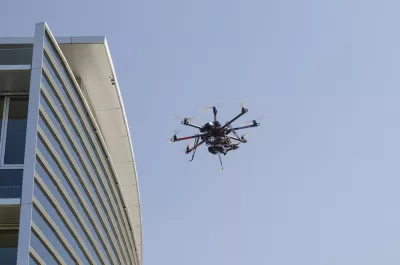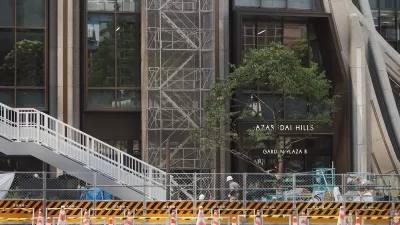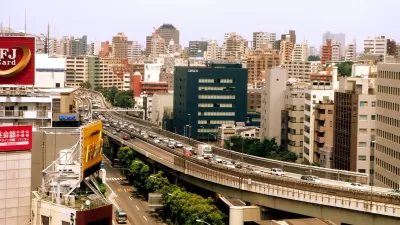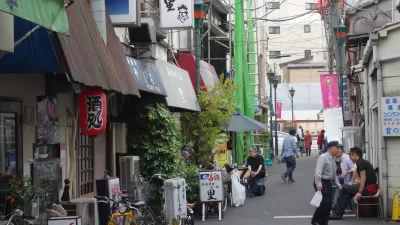With fewer human workers available to meet demand, Japanese construction company Komatsu is turning to automated equipment and drones.

Faced with too few employees to meet demand in the run up to the Tokyo 2020 Olympics, Japanese construction firm Komatsu has turned to an automated fleet of construction vehicles to do the dirty work. Ben Popper reports in The Verge that the Japanese company is now partnering with an American drone company to further speed the construction process, eliminating the need for human surveyors to draw the maps that guide the automated construction vehicles.
"To get around this problem, Komatsu has begun creating a new service it calls Smart Construction. A team of robotic vehicles scoops rock and pushes dirt without a human behind the wheel. They are guided in their work by a fleet of drones, which map the area in three dimensions and update the data in real time to track how the massive volumes of soil and cement are moving around the site."
The American drone company, Skycatch, is able to reduce the land surveying process from two weeks to "one day, or even 30 minutes"” So can we expect to see robots and drones on American construction sites? Probably not any time soon, as Skycatch CEO Christian Sanz notes that current regulations in the United States make it difficult to go to a fully automated construction crew.
FULL STORY: Robo-bulldozers guided by drones are helping ease Japan's labor shortage

Alabama: Trump Terminates Settlements for Black Communities Harmed By Raw Sewage
Trump deemed the landmark civil rights agreement “illegal DEI and environmental justice policy.”

Study: Maui’s Plan to Convert Vacation Rentals to Long-Term Housing Could Cause Nearly $1 Billion Economic Loss
The plan would reduce visitor accommodation by 25% resulting in 1,900 jobs lost.

Planetizen Federal Action Tracker
A weekly monitor of how Trump’s orders and actions are impacting planners and planning in America.

Waymo Gets Permission to Map SF’s Market Street
If allowed to operate on the traffic-restricted street, Waymo’s autonomous taxis would have a leg up over ride-hailing competitors — and counter the city’s efforts to grow bike and pedestrian on the thoroughfare.

Parklet Symposium Highlights the Success of Shared Spaces
Parklets got a boost during the Covid-19 pandemic, when the concept was translated to outdoor dining programs that offered restaurants a lifeline during the shutdown.

Federal Homelessness Agency Places Entire Staff on Leave
The U.S. Interagency Council on Homelessness is the only federal agency dedicated to preventing and ending homelessness.
Urban Design for Planners 1: Software Tools
This six-course series explores essential urban design concepts using open source software and equips planners with the tools they need to participate fully in the urban design process.
Planning for Universal Design
Learn the tools for implementing Universal Design in planning regulations.
Caltrans
Smith Gee Studio
Institute for Housing and Urban Development Studies (IHS)
City of Grandview
Harvard GSD Executive Education
Toledo-Lucas County Plan Commissions
Salt Lake City
NYU Wagner Graduate School of Public Service





























